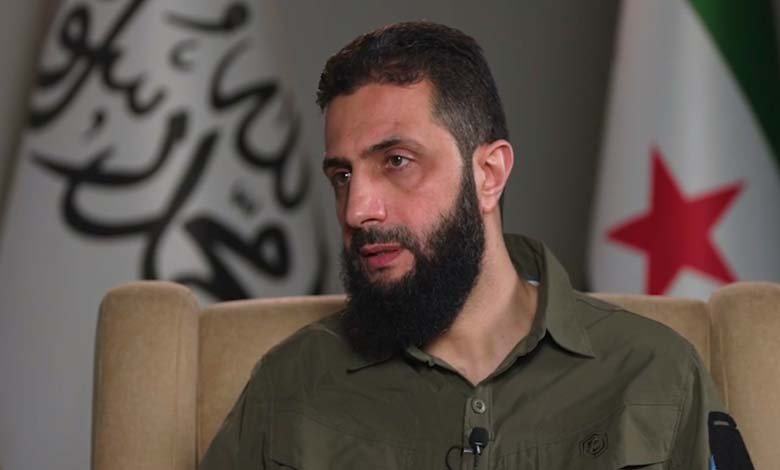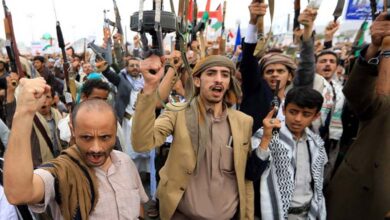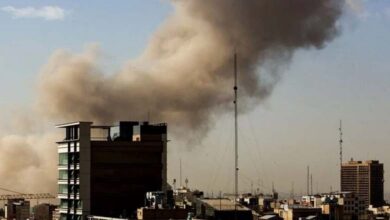From Al-Qaeda’s veil to the political shirt: Who is Abu Mohammed al-Julani?

Attempting to adopt a different discourse from what he had been accustomed to for years, in order to change the stereotypical image associated with him due to his ties with extremist organizations, he led the Syrian armed opposition until the fall of President Bashar al-Assad.
-
Amid Regional Escalation: Experts Warn of the Return of Armed Groups and Political Islam Movements
-
Hama Countryside: Massive Syrian Army Reinforcements and “Mass Fleeing” of Militants
This is Ahmed Hussein al-Shar’a, who abandoned his nom de guerre « Abu Mohammed al-Julani », which was linked to these extremist groups, and adopted a discourse to erase the memories of those years when he moved between several organizations and split from them.
Before leading the armed opposition factions, al-Julani had declared that his goal was to overthrow Bashar al-Assad, who had been in power since 2000.
-
Latest Developments on the Syrian Scene
-
Aleppo Clashes: Syrian Army “Cleanses” Several Areas and Prepares for a Counterattack
Who is « al-Julani »?
Ahmed Hussein al-Shar’a was born in 1982 and grew up in the Mezzeh neighborhood of Damascus, in a well-off family. He began studying medicine but did not complete his studies.
His nom de guerre « Abu Mohammed al-Julani », according to what he told PBS in 2021, comes from his family’s origins in the Golan Heights, with his grandfather having been displaced from the Golan after Israel’s occupation of a large part of this Syrian plateau in 1967.
The first signs of “radicalization” appeared in his life after the September 11, 2001 attacks in the United States. He began attending religious sermons and secret meetings in the suburbs of Damascus, according to Middle East Eye.
-
Complex Situation and Declaration of War: Escalating Crisis Between Arab Tribes and Syrian Democratic Forces
-
The Syrian Democratic Forces Imposes Curfew in Deir ez-Zor as Battles Escalate with Tribes
After the U.S. invasion of Iraq in 2003, he went to fight in neighboring Iraq, where he joined al-Qaeda under the leadership of Abu Musab al-Zarqawi before being imprisoned for five years.
With the start of the uprising against al-Assad in 2011, he returned to Syria and founded « Jabhat al-Nusra », which later became « Hay’at Tahrir al-Sham ». In 2013, he refused to get closer to Abu Bakr al-Baghdadi, the leader of ISIS, and preferred Ayman al-Zawahiri, the leader of al-Qaeda.
Pragmatic
Tall, with a robust physique, black beard, and piercing eyes, al-Julani gradually abandoned the white turban he wore at the beginning of the war to adopt a military uniform or sometimes civilian clothes. His supporters consider him “realistic,” while his opponents describe him as “pragmatic.” However, he began to change the stereotyped image of him since 2015 by declaring that he “did not intend to carry out attacks against the West, as ISIS or al-Qaeda did.”
-
Syrian Analyst: What’s happening in Suwayda is attempts to sow discord and create a state of disturbance among citizens
-
Turkey-backed armed faction leader killed in Syria’s Ras al-Ain
He broke away from al-Qaeda in 2016, explaining that this decision was meant to “eliminate the pretexts for the international community to attack his group” and tried to present himself as more moderate.
In 2017, he abandoned the name Jabhat al-Nusra, too closely associated with al-Qaeda, and created « Hay’at Tahrir al-Sham », forcing the factions in northern Syria to join his group after clashes and tensions between armed groups.
He then formed a civilian administration to manage the areas controlled by his group in northwestern Syria. According to Syrian Islamist groups expert Thomas Pierret, interviewed by AFP, “he is pragmatic; he continues his trajectory as a statesman.”
-
Turkey is preparing to send a new lot of Syrian mercenaries to Libya
-
Ukraine and Lebanon: Two Separate Wars That Changed Syria’s Fate
In a new sign of his desire to change his image, after his group’s offensive against government forces began on November 27, he began presenting himself by his real name, Ahmed al-Shar’a, instead of his nom de guerre.
Appeasing the « minorities »
After the start of the armed opposition’s attack, al-Julani sought to reassure the residents of Aleppo, which has a large Christian community, by asking his fighters to “maintain security in the liberated areas.” He visited last Wednesday the Aleppo Citadel, Syria’s second-largest city, after his fighters took control of it, and sent reassuring messages to Christians, assuring them that they “would not be harmed.”
Thomas Pierret said to AFP that he is an “extremist pragmatist.”
-
Al-Assad’s Fall Weakens Iran but Doesn’t End Its Capabilities in the Middle East
-
A New Study Outlines Possible Scenarios for Syria’s Future
Last week, the Syrian armed opposition broadcast its first statement on official Syrian television, claiming to have “overthrown President Bashar al-Assad.” A group of nine people appeared on the screen of the official news studio, with one of them reading a statement attributed to the “Damascus opening operations room,” announcing the “liberation of Damascus and the fall of Bashar al-Assad.”
They also announced the “liberation of all prisoners in the prisons” and described them as “victims of injustice.”
They called on fighters and civilians not to approach public institutions of the state and to preserve them.
Syrian Prime Minister Mohammad Ghazi al-Jalali appeared in a video, announcing that he was ready to support the continued management of state affairs.
-
Timeline of Events in Syria: How Did Damascus Fall into Rebel Hands?
-
Washington Warns al-Assad against Using Chemical Weapons in Response to His Defeats
In a video released on his official Facebook account, he confirmed that he would remain at home, ready to support the management of state affairs after President Bashar al-Assad‘s departure from Damascus, following the entry of armed opposition forces into the capital. He confirmed that his government was “ready to cooperate with any leadership chosen by the people” and that he would be “at the Cabinet on Sunday morning and ready for any transfer procedure.”
Shortly after, the Syrian armed opposition published a statement through its Telegram accounts, announcing the “fall” of President Bashar al-Assad’s regime and urging its forces not to approach public institutions in Damascus, which were placed under the management of the previous Prime Minister, Mohammad Ghazi al-Jalali.
-
Pro-Turkish Factions Control Half of Aleppo
-
Returned from Death: A Decade of Struggle for the Reunification of Missing Yazidis
In a message published on his Telegram accounts, Ahmed al-Shar’a, alias Abu Mohammed al-Julani, the leader of Hay’at Tahrir al-Sham, declared Sunday morning, “To all the military forces in the city of Damascus, it is strictly forbidden to approach public institutions, which will remain under the supervision of the previous Prime Minister until their official handover, and it is forbidden to shoot bullets into the air.”











